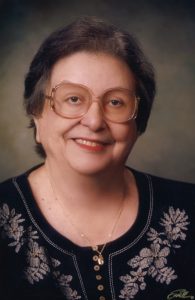
From the 2020 Collegian | Those who knew long-time history professor Dr. Helen Delpar describe her as a character. Voted “Most Likely to Succeed” by her high school classmates, she never owned a car and instead walked to work nearly every day until she retired in her late 60s. Though she never married and enjoyed solitude, she loved the company of others and had a deep-seated drive to focus her intellect and abilities into not only improving herself, but also serving the larger community.
“To be honest, I was kind of intimidated even before I met her,” said Dr. Steve Bunker, who came to know Delpar after filling her position when she retired from UA in 2006. “She was rather cantankerous at times and challenging, but she was an impressive person who was fundamentally generous. When she saw anyone having a rough time, she was there.”
When UA hired Delpar as an assistant professor in 1974, the Latin American studies program didn’t exist, though Delpar quickly put UA on the map for the subject as a prolific Latin American scholar. She and faculty members Larry Clayton and Ed Moseley made UA the seat of the Southeastern Council of Latin American Studies, of which Delpar would later serve as president.
Perhaps her biggest legacy, however, stemmed from her role as director of UA’s graduate program in history. Having been given a chance herself to pursue a Ph.D. at Columbia University in the 1960s, Delpar felt it her duty to expand opportunity for others.
“She felt that our job as a state university was to provide opportunities—to look for diamonds in the rough and to provide students with the opportunities and guidance to become great scholars and people,” Bunker said.
In making plans for her estate, her fondness for graduate students guided her. After passing away in 2018, Delpar gifted the University with $750,000 to establish the Helen Delpar Endowment for Latin American Studies supporting graduate students and a lecture series.
“She had been lucky herself to go for a summer and do research for her dissertation, and to not have to worry about cobbling together funding,” Bunker said. “She thought that was really important for graduate students to focus on their work and produce excellent scholarship without having to worry about the money.”
Delpar’s own interest in the field also dovetails with a growing interest in Latino history nationwide as well as UA’s increasing focus on international collaborations and scholarship.
“She saw an area that could be helped, and she didn’t need to have $20 million to do it,” Bunker said. “She saw that a little went a long way, and she saw her gift as a way of rounding out the opportunities that the history department and the College could provide for graduate students. She felt that this gift could do the most good.
“She was really remarkable, and UA was really lucky to have for 32 years on faculty. It is a fitting legacy for her.”